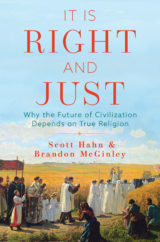By Scott Hahn and Brandon McGinley
Scott Hahn is the author or editor of over forty popular and academic books. His works include best-selling titles Rome Sweet Home, The Lamb’s Supper, and The First Society. His most recent book is It Is Right and Just: Why the Future of Civilization Depends on True Religion.
Brandon McGinley is a Catholic writer and speaker based in Pittsburgh, Pennsylvania. McGinley’s work has appeared in the Washington Post, First Things, the Catholic Herald, Plough, and The Lamp, among other venues. He is the author of The Prodigal Church: Restoring Catholic Tradition in an Age of Deception.

The ideas that most influence society are not necessarily those which people actively affirm but those which go without saying—that is, those notions that we don’t even realize we’re organizing our lives around because we’ve never had to think about them, like a fish never thinks about water.
The rise and fall of religious observances is a good example. There was a time when asking someone to perform nonessential work on a Sunday would have been unthinkable. Now, to decline work on a Sunday would be unthinkable. It is simply assumed by employers, especially in seven-day industries like retail, that employees are to be available on Sunday. The liturgical and civil calendars have always operated in parallel, but now it is really the restless calendar of the market that trumps all. This tells us something about what duties occupy the highest place in our society—and they aren’t duties to God.
The principle of “it goes without saying” is clearest in everyday realities like work and especially marriage and family. The rapid transformation of same-sex marriage from a radical notion with a tiny following to an overwhelming cultural-political movement is a helpful example. While the gains made by the movement were certainly consolidated by the heavy-handed use of power, both in terms of the law and in terms of social pressure, the fact is that no social movement succeeds as quickly and comprehensively as same-sex marriage did unless the people were primed for it.
And the fact of the matter is that the prevailing assumptions (“what went without saying”) among Americans about the nature of marriage left little reason to oppose the movement. By the 2000s (and probably for some time before that), the consensus was that marriage is primarily about companionship and mutual fulfillment, not about children or forging families, and certainly not about a binding sacramental oath made before God. You could have polled Americans about their views and found results indicating this, but a better procedure would be simply to observe our laws and customs about marriage, which reflect the real principles we organize our lives around.
By the early 1980s, no-fault divorce had been established nearly nationwide. At the same time, prenuptial agreements, which are generally based on the assumption that divorce is a possibility, were entering the mainstream. The idea of marriage’s permanence, while still affirmed in theory by some, was lost on a social level. It now went without saying that marriage was even less sacred than a business contract since it could be broken by either party for any reason.
This also reveals what our society thinks about marriage and children. No culture that thinks marriage is for the benefit of children, or even about children in any way at all, would make it so fragile. Meanwhile, with the collapse of anti-contraception laws in the mid-1960s, artificial birth control entered the mainstream. Now, it goes without saying that women are on “the pill” or some other form of contraception practically from puberty to menopause. Doctors don’t ask if women and girls want to use contraception but which form they prefer. This is a custom that reveals a principle: fertility must be strictly controlled, and babies are only good when they’re planned.
Taken together, the laws and customs of late-twentieth-century America, in revealing the actual principles of morality, justice, and duty around which we organized our lives, were a more accurate portrait of our culture than straightforward polling on same-sex marriage. There were some countervailing signals, like the Defense of Marriage Act itself, but these proved incoherent against the consistent and powerful message that came from everything else: marriage is about adult companionship and fulfillment.
These laws and customs, in turn, inform the way we think about and experience the world, creating a feedback loop. They can even raise up the boundaries within which we think. Certain ways of living can begin to seem either impossible (such as seriously committing to openness to life in marriage) or unavoidable (such as making moral compromises to gain social and financial stability). What we believe—and especially who and what we honor—forms our very reality.
There is no neutrality. There is no perch above the fray. There is no Switzerland. There is no comfortable indifference.
This claim might feel a little frightening at first. To be sure, its implications are enormous, affecting the way we think about everything from the global political order to our closest relationships with family and friends. But this is also a liberating fact: It cuts through the assertions of objectivity, fairness, and peacefulness of the atheist or religious indifferentist. It allows us to see that they, too, are making universal claims—in fact, deeply religious claims—about truth, justice, and morality, even and especially when they claim not to be doing so.
And so we should feel emboldened to do the same—to preach the realities of grace and salvation and Christ crucified instead of watered-down pablum that’s never actually secular enough for the secular order. The question isn’t whether society will be based in religious principles but rather which principles will be reflected and supported and which will be ignored and suppressed. The question is whether justice will be done to God or whether injustice will reign.
Political systems that claim not to be based in or to favor religious principles have an unsurprising habit of failing in this most basic regard.
Learn More

Is religion a right given to us by the state? Is it an opium for the masses? Is it private opinion with no role in the public sphere?
In It Is Right and Just, bestselling author Scott Hahn and Brandon McGinley challenge our idea of religion and its role in society. Hahn and McGinley argue that to answer questions over religious liberty, justice, and peace, we must first reject the insidious lie perpetuated by secular-liberal culture: that religion is a private matter.